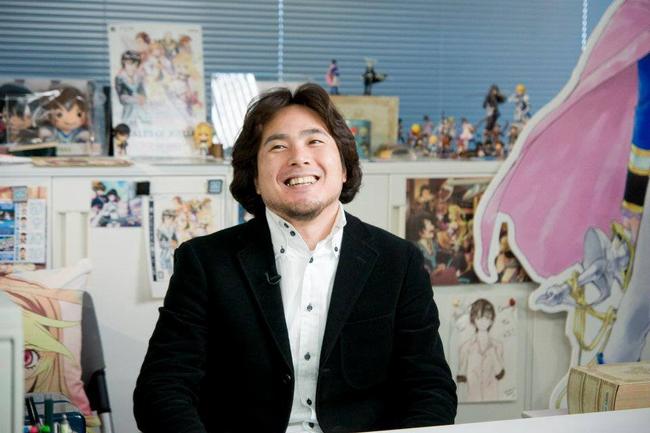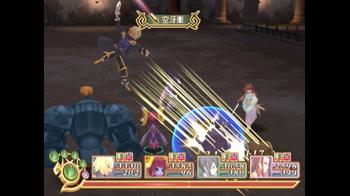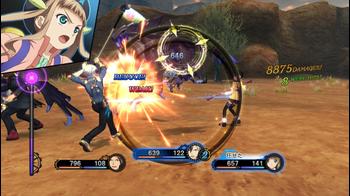
Talking Tales with Hideo Baba, Tales of Series Producer
Fans of the Tales of series have been on something of a rollercoaster ride. After the releases of the brilliant Tales of Vesperia and Tales of Symphonia: Dawn of the New World the series seemed to disappear from Western release slates - some feared forever.
Fans yelled and hollered through social media, and a forward-thinking Namco listened. Starting with Tales of Graces f, Namco Bandai is putting a great deal of effort into establishing this long-running Japanese franchise more fully in the West. We get to chat with the ever-optimistic and enthusiastic producer for the franchise, Hideo Baba, about their efforts. Enjoy.

RPG Site: First off, you guys have pleased a lot of hardcore fans by not only bringing Tales of Symphonia Chronicles over but also by preserving Japanese audio alongside the English dub for the release. How does dual-audio impact development of the game?
Hideo Baba: I received numerous requests from European fans to include Japanese voiceovers in the localized Tales games. To achieve this we had to overcome various obstacles such as licensing issues. We’ve been working on this for a long time. For Symphonia, the timing was right and it was possible for us to add the Japanese voiceovers. Fans outside of Japan can now enjoy the original Japanese voiceovers!
RPG Site: Fans are already keen to know - will dual-audio become a standard feature for future titles, or is it exclusive to Chronicles?
Hideo Baba: We will make adjustments to include Japanese voiceovers for Tales titles in the future. Right now we don’t know the possibilities for other titles besides Tales of Symphonia Chronicles - For now it will be the only title with dual-audio.
RPG Site: Tales of Xillia and Tales of Xillia 2 explored a more futuristic setting rather than the classical fantasy setting. Should we expect to see more futuristic settings in the series from here on?
Hideo Baba: Actually, the world of Tales of Xillia is based on the series’ classical fantasy setting. We wanted to portray Elympios as a different, modern world. In other words, it is an unknown world that is completely different from swords and spirits.
For Tales of Xillia 2, Elympios was the primary setting for the story but the futuristic setting exists only within the world of Tales of Xillia. Sadly, the modern world setting will not be the direction for future Tales titles. I would like to keep the classical fantasy world setting as a root for the series.
RPG Site: Tales of Xillia made excellent strides forward in its battle systems. For one, it included real-time party member swaps - but this feature was removed for its sequel. Why drop such a feature, and should we expect it to return in the future?
Hideo Baba: We always challenge ourselves to innovate the battle system for every Tales title. For example, Tales of Destiny on the PlayStation 2 introduced the Chain Capacity system that broke out of the typical Linear Motion Battle System paradigm. It allowed for more exhilarating and speedier battles rather than annoying battles in RPGs. Players could enjoy battles no matter how many times they fought.
In Tales of Xillia we also performed new challenges of introducing Linking and it enabled players to link two characters to cooperate in battles. As you can see, we like to undertake new challenges to provide new gameplay experiences to the players. For Tales of Xillia 2 we introduced a new battle system that enabled Ludger, the main character, to swap between three different types of weapons.
If we implemented various battle systems into the game it would become too complicated. So, we tune the battle system based on the theme of the title. As for the future, we’re unsure if we will introduce real-time swapping in future titles.
RPG Site: Each Tales game has a central theme running through the narrative experience. For Vesperia it was justice and for Abyss it was the meaning of life. How do you decide upon these themes and what is the thought process behind them?
Hideo Baba: I decide the theme for each title by considering the current circumstances in Japan and the world. This theme is then depicted through the main character and reflected in the fantasy world that each Tales title takes place in.
The theme is universal, however, regardless of the world. For example, Milla from Tales of Xillia describes how difficult it is to have a conviction and persevere in life. She also realizes how important it is to hold steadfast to your dreams, hope, and goals in a person’s heart.
Video games are entertainment but that is not their sole purpose. I want players to feel encouraged and not forget that courage, zeal, and working hard are important through each Tales stories. Some of the themes are very delicate but I think the various themes that each Tales game tackles can be of help to players everywhere. Tales of Xillia 2’s theme is “choice.” Please look forward to it!
RPG Site: What are some of your favorite influences - games, movies, novels, or anything else - that inspire the stories or gameplay found in Tales?
Hideo Baba: The basic concept of how we design Tales games has not changed significantly. Our basic view is to constantly create and provide a “new experience.” In a long-running franchise, the new title is always going to be compared to the previous one, thus we strive to develop a better game than the previous title and include new gameplay experiences. We want players to feel “I had never experienced this gameplay before!”
My favorite books are written by Richard Bach and Michael Ende. They are very important to me. Richard Bach’s works always make me revisit human roots such as truth in life, form of perception, point of view, how people create ideas and so on.
Jonathan Livingston Seagull is extremely specially to me. Wings act as a symbol for characters to stay steadfast in seeking self-realization and their convictions despite being treated as a freak or becoming isolated. I think this story describes how human beings are like seagulls in many ways.
In Michael Ende’s Momo and The Neverending Story spirituality in society is a strong focus. They are contextualized in the history, culture, and customs of the world at the time. I highly recommend reading these works.
RPG Site: Tales of Xillia 2 was praised for being a more mature story. What was the thought process behind this tone, which is a departure from previous titles in the franchise?
Hideo Baba: I believe the biggest reason is Tales of Xillia 2’s theme being expressed in gameplay. The theme is “choice” and playser must make numerous decisions to unfold the story. I wanted to paint an image of people having to live in the real world with self-responsibility.
As a result, the main character is not a teenage boy but a male in his twenties to make him a more convincing character. In addition, the atmosphere of the world in Xillia 2 is not so bright but a bit sober and that helps.
RPG Site: How do you feel after meeting and interacting with the Western Tales fans at japan Expo and such? What is it like to finally deliver titles like Xillia after years of waiting?
Hideo Baba: Recently we have been announcing big news at every year in Japan Expo in Paris. I’m glad that I can keep communicating with European fans for several years and I can understand from the bottom of my heart that they have a strong passion and love for the series as the Japanese fans.
The main audience for the Tales of series has been in Japan until now but is well worth it to work step-by-step to make sure fans are enjoying the series all over the world. Of course, I would like to attend more events and connect with more people in various countries. I want more users in Europe and America to discover and enjoy the series.
I really appreciate the fans all over the world for their continuous support of the Tales of series!
RPG Site: Thank you for your time!


